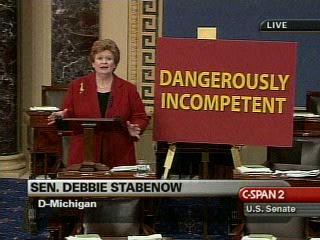 Clinking glasses with one of America's enemies: For Albright, it's not about "good and evil," indeed.Madeleine Albright
Clinking glasses with one of America's enemies: For Albright, it's not about "good and evil," indeed.Madeleine Albright, one of the least distinguished Secretaries of State in American history, now presumes to step forward to advise the Bush Administration on what it should be doing in the Middle East.
What's notable is the lack of any real guidance -- just a bunch of ersatz
realpolitik and posturing about "complexity." Surely
Jennifer Loven, so quick to object to Bush's alleged use of "straw men," will have a field day with Albright.
Albright criticizes: "For years, the president has acted as if Al Qaeda, Saddam Hussein's followers and Iran's mullahs were parts of the same problem." Well, for someone who is so versed in "complexity" and nuance, shouldn't she understand that it all depends on how you define the problem? President Bush has never said that the three were indistinguishable or the same; rather, he has argued (rightly, in my view) that all three are manifestations of the same underlying problem: A radicalism and aggression that flourishes when in the absence of freedom and democracy.
She goes on to write, disingenuously:
When the U.S. invaded Iraq, Bush may have thought he was striking a blow for good over evil, but the forces unleashed were considerably more complex. Perhaps. But she is trying to make it sound as though the President ordered the invasion of Iraq simply to "strike a blow for good over evil." As every American knows, the world believed that Iraq had WMD; we couldn't risk those falling into the hands of Al Qaeda (an even more realistic threat in light of
these contacts). Helping Iraq become a free and democratic country, as the President advocated likewise in the run-up to the war, is also more than the simplistic fairy tale notion Albright envisions -- I haven't noticed her coming up with any better way to stop the spawning of America-hating terrorists.
Her three suggestions are worthless. First, she notes that problems in Iraq can best be solved by the US acting as a "referee" -- where has she been? That's what we've been trying to do as the Parliament convenes. Second, she advocates the continued use of the "carrot" approach with Iran, because it "will be less willing to cooperate in Iraq and to compromise on nuclear issues if it is being threatened with destruction." So far, the carrot approach hasn't yielded much -- and as any negotiator
should know, incentives are more likely to be appreciated if their recipient understands that other options are available, but not being used (it worked to persuade Ghaddafi to surrnder Libya's nuclear weapons). Third, she argues that the "march of freedom" isn't the big story in the Middle East. Really? Maybe the people in Egypt -- who actually got to vote in a less-rigged election -- would disagree, as would those in Afghanistan and, yes, even Iraq. Why does she think the Iranians are so eager to intervene in Iraq? It's because they understand the impact of having a free and democratic neighbor on their own despotism.
It's amazing, given her record, that Madeleine Albright would criticize this Administration for anything. She's the one who was
duped by the North Koreans, who continued to build nuclear bombs on her watch -- and who did
nothing with Iran, besides "open talks" 10 months before the end of the Clinton Administration. As for the intervention in Bosnia, apparently simply striking a blow for "good vs. evil" thinking is OK when she does it . . . because no deeper "strategy" was ever evident in that foray.
Everyone knows that the Clinton Administration did nothing but kick the foreign-policy can down the road, and leave problems for the succeeding Administration to handle. Albright is the prime example of that operating procedure. So now, it's unfortunate -- and even a touch dishonorable -- that she chooses to emerge and criticize the Bush Administration's approach to handling the issues that she had the opportunity to address . . . and didn't.





